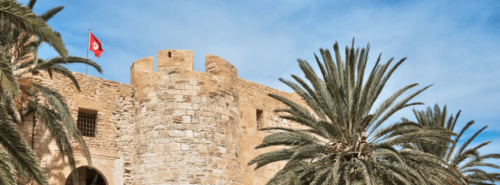
 By Naomi Houston
By Naomi Houston
What more could you ask for when finding the perfect holiday destination? With so much to offer, it might come as a surprise that this little-known holiday destination costs just a fraction of your average holiday hot spots like Santorini or Spain.
Where could this dreamy place be? I hear you ask. It is situated in North Africa. Tunisia has everything you need and more when it comes to holidaying this summer, and to make life even easier, flights to Tunisia are now jetting off from Belfast!
A bit about Tunisia
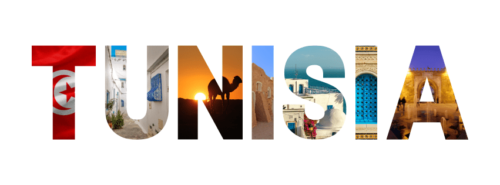
The Republic of Tunisia is the northernmost country in Africa. Its coastline overlooks the Mediterranean Sea, and there is no shortage of beautiful coastal towns and beaches to admire. The country’s slogan is ‘Unique Tunisia’, which is very fitting. Although much of Tunisia’s cuisine and cultural practices stem from many different places such as Italy and Malta, the Tunisian peoples zest for life, passion for their country and love for their communities is like no other.
While exploring Tunisia’s stunning coastal towns, bustling cities and quaint villages, there was a fantastic atmosphere everywhere I went. The smell of orange blossoms drifting in the wind, olive trees lining the country fields, and coffee shops with locals sitting outside, mingling in the sun.
It surprised me that almost everybody spoke French in a country where 96% of people are Muslim. This is because the country was sold to the French in 1881, and although Tunisia gained independence in 1956, the language stuck. Of course, there are Arabic and some English speakers, but when greeting people or saying please and thank you, I use my limited French.
With the average monthly income of a Tunisian household being about £350, the cost of living is much cheaper than in other destinations. However, this doesn’t mean it lacks luxury or quality; it’s quite the opposite. Locals take so much pride in what they do, and this care and attention to detail shows in their service and their craftsmanship.
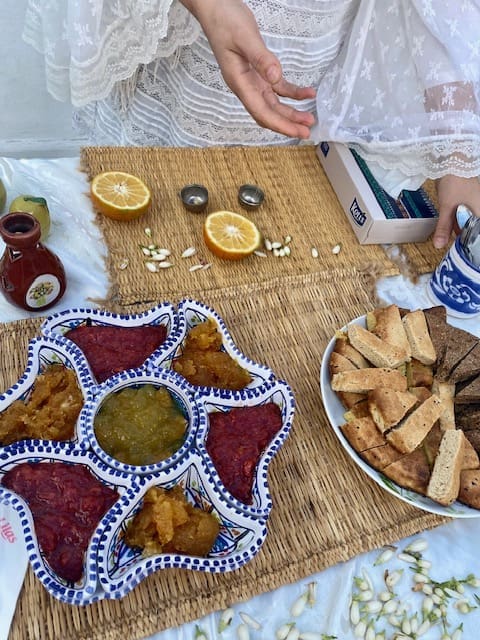
Where to stay?
There are plenty of places to stay in Tunisia that suit anybody’s taste. Whether you’re looking for a relaxing 5* spa resort, a tranquil farm stay in the countryside, or a family hotel with waterslides and entertainment, you can find it all here.
TUI offer family and adult-only packages to Tunisia.
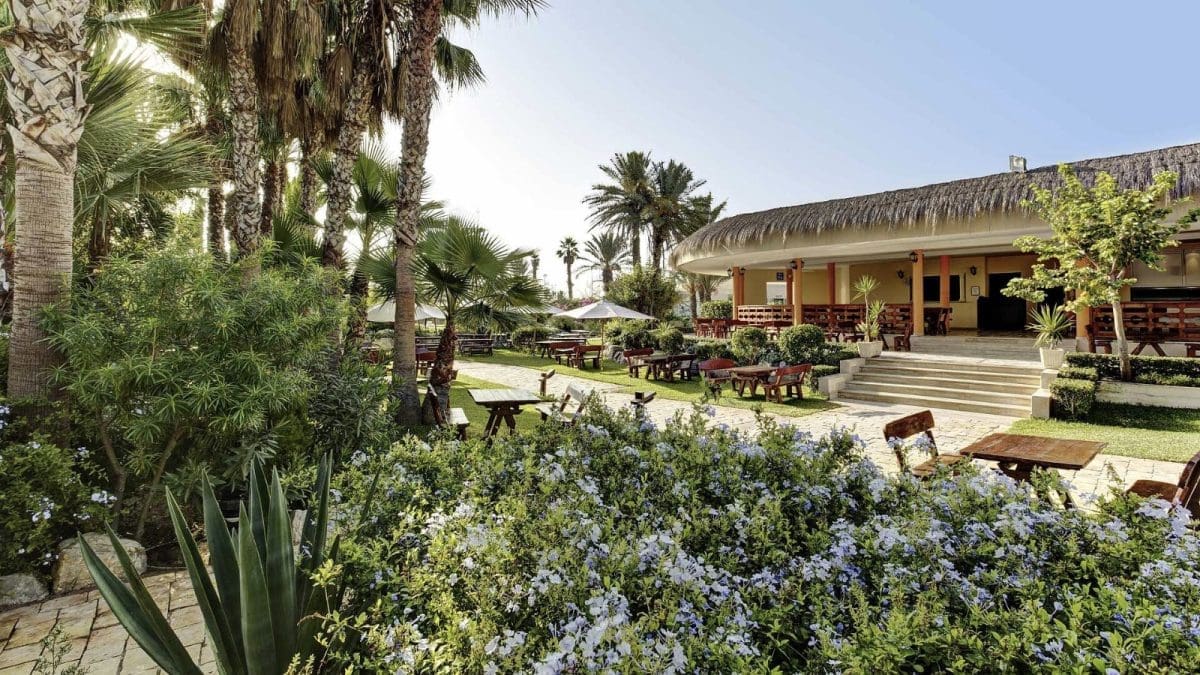
I stayed in the TUI Africana Hotel in Yasmine Hammamet for three nights, and I have to say, it was a beautiful hotel and the location, wow. I had a double superior room with ocean view, and it came with the following spec.
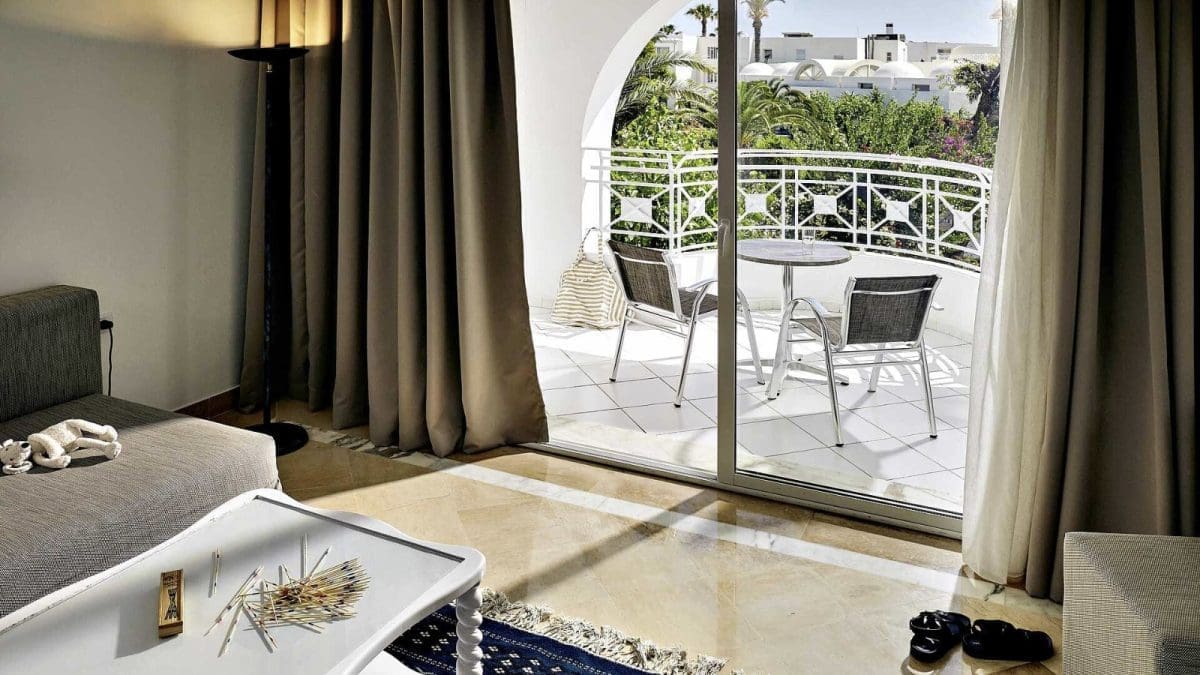 Direct ocean view
Direct ocean view- 44 m²
- 1 massive double bed
- Air conditioning: personally adjustable, centrally controlled
- Flooring: tiles
- Safe: no charge
- Minibar: water on arrival/if needed and soft drinks on arrival
- Telephone, internet: Wi-Fi: no extra charge. TV: flatscreen, satellite TV
- Room service: on request, charged
- Cleaning service: daily
- Shower, WC, hairdryer
- Balcony: with seating
My bedroom was palatial, and the bed was almost wider than it was long. Beautiful white sheets and pillowcases complemented the turquoise sea outside my window.
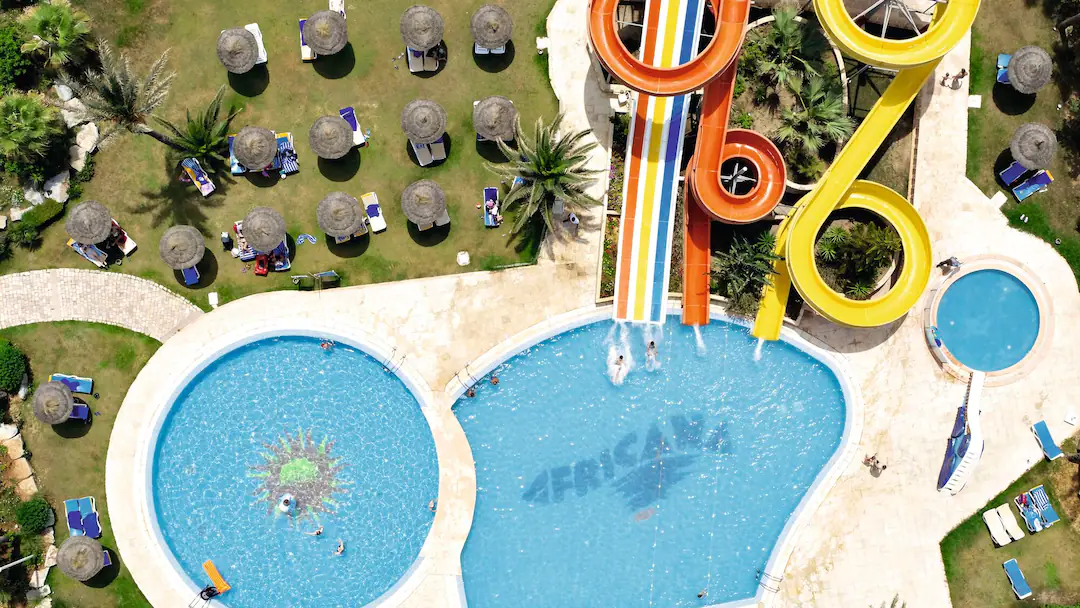
The TUI Africana Hotel in Yasmine Hammamet is a family hotel and has entertainment on most nights, a Hammam spa, a shop, excellent staff, indoor and outdoor pools, waterslides, bars, multiple restaurants onsite and its private selection of beaches. In the spirit of time-honoured traditions lies a sanctuary of relaxation and revitalization – the Hammam Spa. Originating from the ancient Roman thermae and perfected over centuries in the Middle East and North Africa, the Hammam Spa encapsulates an exquisite blend of wellness practices.
This haven is not merely a spa; it’s a journey back to the roots of spa culture, where every treatment is a blend of ritualistic healing and sensorial delight. Don’t worry, folks, you keep your costumes on.
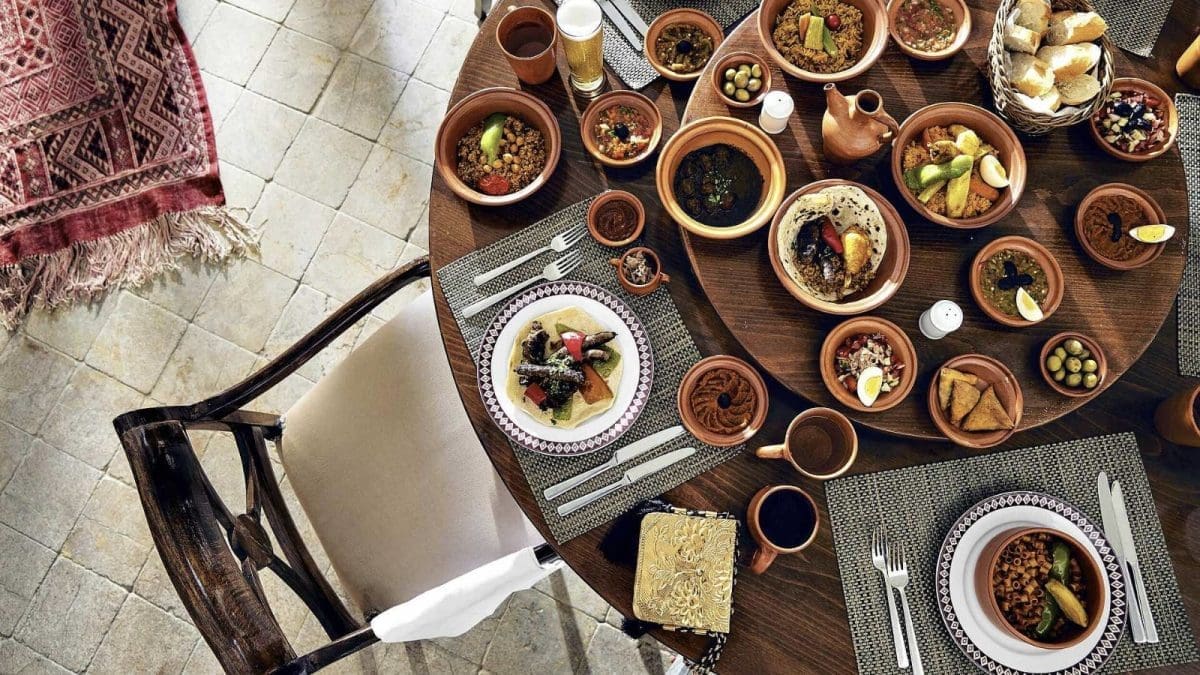

Dining
The resort has 4 restaurants
- Main restaurant “Magico”
- Speciality restaurant “Trattoria” (international)
- Tunisian speciality restaurant (local)
- Speciality restaurant “Downtown” (inspired by the food truck concept)
One of the most important aspects of a hotel is the food, I can assure you it was beautifully cooked, well presented and there was plenty of it. It’s worth experiencing the Tunisian cuisine as well. The TUI Africana Hotel Yasmine Hammamet would be perfect for families; with everything you need all in one place.
Transfers
It takes about an hour to get to the hotel from Tunis Airport, and a Taxi or private transfer is your best bet for quick and convenient transport to your chosen hotel.
If you want to see more of Tunisia, try a town called ‘Dar Zaghoun’ It takes about an hour and a half to get to Zaghoun from Tunis Airport, but the drive has some beautiful views, and the destination is worth the longer journey. ‘Dar Zaghoun’ is a sustainable farm stay resort
that was built over the past 20 years by the owner, Skandar. The animal shelters, park, Hammam spa and 20 farmhouse hotel rooms were (for the most part) built using recycled materials that were going to get thrown out.
 There is a restaurant on site, and everything cooked in the restaurant is made using ingredients directly from the farm. There is also a café, which serves traditional beverages such as Arabic coffee and a healthy tea named Tizan (both are very tasty). There is also a little shop, and the products in it are produced by one lady. She makes soap, jewellery, handbagsand other little trinkets. I bought a beautiful handmade bag from her, which only cost me £3.50, and some soap, which was made from orange blossom, which is known for its healing properties.
There is a restaurant on site, and everything cooked in the restaurant is made using ingredients directly from the farm. There is also a café, which serves traditional beverages such as Arabic coffee and a healthy tea named Tizan (both are very tasty). There is also a little shop, and the products in it are produced by one lady. She makes soap, jewellery, handbagsand other little trinkets. I bought a beautiful handmade bag from her, which only cost me £3.50, and some soap, which was made from orange blossom, which is known for its healing properties.
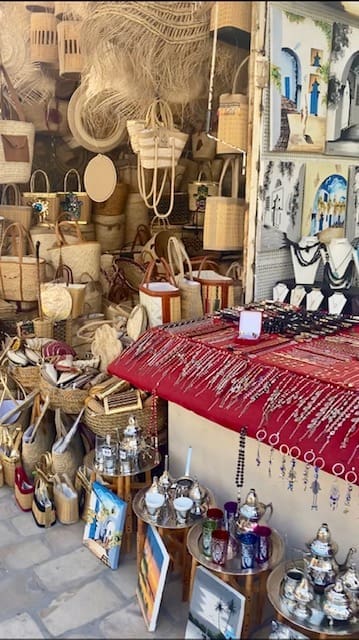
If you’re looking for a different type of luxury accommodation, Sidi Bou Said has exactly that. A train from Tunis Airport to Sidi Bou Said takes about half an hour and costs around £1. The Santorini lookalike boasts a large variety of accommodations from B&B’s, which cost only £15 a night, to their most expensive boutique hotel, ‘Dar Said’, which costs about £300 a night. With only 24 rooms and a Hammam spa, your personal comfort and experience will be well catered for.
If you want to visit a small coastal town, then try La Marsa. It is a very cosmopolitan village right on the coast.
This coastal paradise is only a 5-minute, 30 pence train journey away from Sidi Bou Said, so although the village is quaint, you won’t be stuck for places to see or go.
Again, ‘Hotel Dar El Marsa’ is perhaps more on the pricier side at £120 a night. But I wouldn’t recommend it if I didn’t think it was worth it. It oozes luxury, with a rooftop pool and restaurant with views overlooking the sea and the La Marsa strip, a restaurant on site, and lovely rooms with their own balconies; it’s perfect for a couple’s getaway or a honeymoon.
What is there to see and do?
There is no shortage of things to see and do in this charming country. My recommendation is, try and go on guided tours when you can. This way, you can learn more about where you are and what you’re seeing, but it ensures your safety too.
In any country where you can’t speak the language etc, it’s important to be cautious of where you are and where you’re going, as place signs, etc., are mostly in French and Arabic.
Most hotels, especially the TUI ones, will offer excursions; if they do not offer them, I’d recommend researching beforehand and finding guided tours. Websites like ‘Tourradar’ offer a wide range of excursions, so definitely have a look before your holiday if sightseeing is on the cards for you.

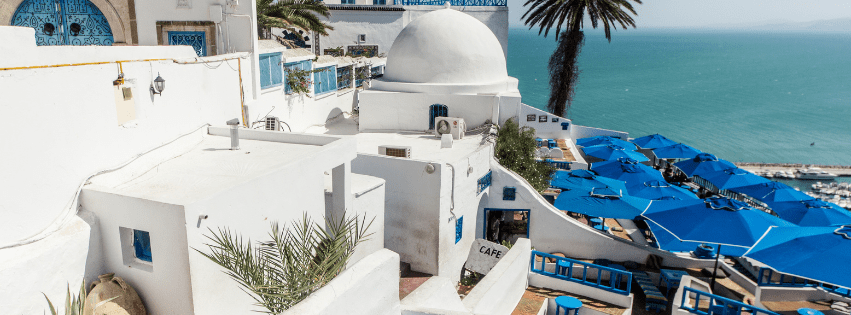
Sidi Bou Said: This place is STUNNING.
It looks exactly like Santorini but without the price tag.
The buildings are all blue and white (by law), and because it is right on the coast, the views are like no other. If you’re looking for a photo opportunity, this is the place to go. As I’ve previously mentioned, there are plenty of restaurants, cafés, and accommodation in this beautiful town.
There are lots of little shops to browse through as well, live street singers create a wonderful atmosphere in this little town, it’s perfect for a day trip or longer stay.
Tunis: Tunis is the capital of Tunisia. The Medina (market) boasts many stalls, including flowers, fish, vegetables, crafts, etc. The town is full of vibrant colours and has lots of French architecture, which has been there since before Tunisia gained its independence. Tunis has a range of boutique hotels, upmarket shops, cafés, and clubs, perfect for younger holidaygoers due to its lively atmosphere and bustling nightlife.
Nabeul: This little-known haven was by far my favourite place to visit. The town is like a maze, with small winding streets leading off in all directions, so definitely go here with a tour guide or local, otherwise it is very likely you will get lost! For me, it is a must-see; the little streets are so vibrant and colourful, with lots of plants and flowers lining the walkways, murals decorating the walls, and doorways painted an array of unique colours like blues, yellows and pinks. It was in this town I felt I experienced the real traditions of Tunisia. Men working in buildings with the doors wide open, crafting bags and mats made of straw, people lining up for the boulangerie and cycling off with 5 baguettes in their bike basket, people mingling with neighbours at their doorstep, kids playing in the street. It really was a beautiful, authentic experience.
While we were there, we visited ‘Dar Abdelhak Lassoued’, a traditional Tunisian house owned by 3 sisters. While there, we got to try homemade blood orange marmalade, Arabic coffee with Tunisia’s famous Zhar (orange blossom distilled water) poured in, and homemade Tunisian bread. The sisters have a family business in olive oil production, thanks to the 150 olive trees that were planted by their grandmother. They pride themselves in producing the best extra virgin olive oil, which is used for medicinal purposes and in cooking and shipped all over the world. The house itself is really interesting to look around; there is a courtyard in the middle of the house, which is common for Tunisian housing; this is instead of a front or back yard or outfacing windows, which allows for complete privacy within the home, so that the Muslim women in the household are able to walk around their houses freely with their hijabs off. It would be remiss of me not to mention the Medina in Nabeul. This market was full of wonderful handmade crafts, food and lots of Tunisian style clothes and pottery. I was pleasantly surprised that walking through the Medina was not stressful like how I’d imagined, I wasn’t getting yanked about by vendors or persuaded into shops, I felt very at ease walking through and found the vendors to be very polite and respectful.
Dougga: These Roman ruins took my breath away. They are very similar in style to the Colosseum in Rome (no surprise there). The ruins are vast and, like a lot of the places I’ve suggested, have an amazing view, this time over the rolling green hills of Tunisia. The excavations are still ongoing, but there is a lot to see. Again, it would be best to have a tour guide for this excursion, although there are signs around which give you a brief description of each building. This place is perfect for history enthusiasts. Just a few minutes from the ruins is a restaurant called ‘Dar Ejdoud’; the food here is delicious, all produced on the farm where it is based, and the view was stunning, looking directly at the ruins from the opposite side of the hill, the only sound was the wind and the occasional tractor driving by, it was lovely.
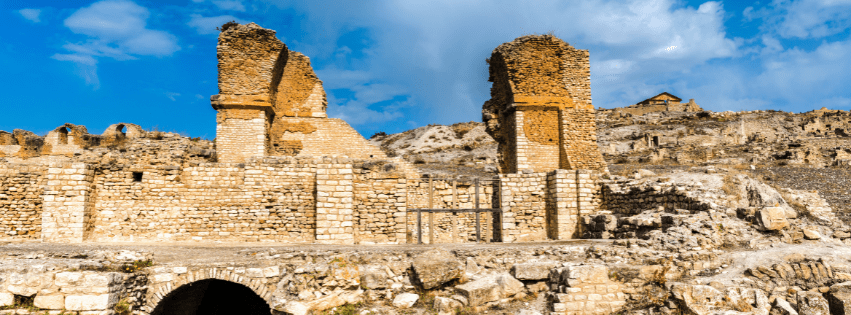
Local Cuisine
Our tour guide, Moncef Battikh, from the Tunisian Tourist Board, described the food in Tunisia as “a mix of Italian, Maltese, and Mediterranean. Nothing like Egyptian or Middle Eastern food.” From what I gathered from my time in Tunisia, the main dishes consist of ingredients such as seafood, meat, olive oil, tomatoes, and spices. The food is mostly organic, and you can really taste the quality. Although Tunisia is an African country, its weather is mild which creates the perfect conditions for growing lots of their own produce. The luscious greenery throughout the country can attest to that.

Here are some of my recommended Tunisian foods and drinks:
- Arabic Coffee: The scent of this coffee is strong but lovely. It is a thicker consistency to normal coffee than you’d get in the UK. It’s made in a small pot where finely ground coffee is boiled with water and sugar or with Zhar (distilled orange blossom water).
- Tizan is a healthy tea concoction made with aromatic herbs and plants. It’s said to relieve pain, boost energy levels, and reduce stress and anxiety.
- Tabouna: This local pitta bread is cooked on a fire; it is commonly put on the table as a starter in restaurants and is eaten with an array of dips.
- Harissa: This is a spicy pulse like sauce, it is served with Tabouna as a starter, but is commonly used in a lot of cooking or stirred into soup to add extra flavour. It’s made using red chilli peppers along with olive oil and garlic. It has quite a kick, so I’d suggest trying a small amount to begin with!
- Tunisian Nwasser: This pasta dish was definitely one of my favourites from my trip. It is basically just square shaped pasta with a tomato sauce and some meat, but it was delightful, this is a dish that I think even the fussiest eater would enjoy.
- Oudnin el kadhi is a delicious dessert. It’s a type of pastry commonly found in Tunisia. It uses flour, eggs, oil, orange flower water, sugar, and salt. The resulting dough is rolled and cut into strips. These are then dipped in hot oil and rolled around a fork.
- Makroudh bun: Eaten in Tunisia and Algeria, makroudh is a pastry made with semolina and filled with dates. I think I ate about 8 of these over two days; they were so tasty!
- Bamboulina: This is a doughnut-type dessert; I tried it in Sidi Bou Said; people come from all over to try the Bamboulina because it is so nice; they cost just 30p.
- Wine: Tunisia is known for producing their own wine due to heavy French influence from before their independence. I only tried rose and white wine, I have to say that both were lovely, I would highly recommend having a glass or two while you’re there.
My dining experiences in Tunisia can’t be faulted. You can get a three-course meal from just £10 in some places, despite the cheap pricing, the organic, traditional dishes don’t lack in quality. The average dining experience consisted of being served tabouna, with a mix of salads and harissa, followed by soup or a starter of your choice, then a main followed by a dessert. Normally, if you weren’t already stuffed by then, a plate of fruit and dates were set on the table and mint tea was offered. They don’t do things by halves In Tunisia.
Getting there

Tunisair flies to Tunis only from either Gatwick or Heathrow every day except Wednesday
EasyJet flies from Belfast & TUI arranges holidays from Belfast using EasyJet flights
Final Thoughts
As a woman in her 20’s, I never felt unsafe during my time in Tunisia, but, like anywhere, it’s important to respect the culture of the place you’re visiting; although there is no dress code, it is a mostly Muslim country, and as a woman, I made sure I was covered up, to respect the local people and their religion.
The locals were absolutely lovely. I don’t have a bad word to say about Tunisia. From start to finish, I had a brilliant trip. There is so much to see and do, so much to learn about, and being able to experience such a different culture to my own was really educational and interesting.
The destination is perfect for any holiday goer: families, couples, friends, old and young. There really is something for everyone here, from beaches to historical sites to markets and shopping. And with flights, accommodation, and food being a fraction of the price you’d expect to pay in other holiday destinations, what’s not to love?
A Santorini-style town, Roman ruins, or French architecture—take your pick. All I have to say is book that flight.



